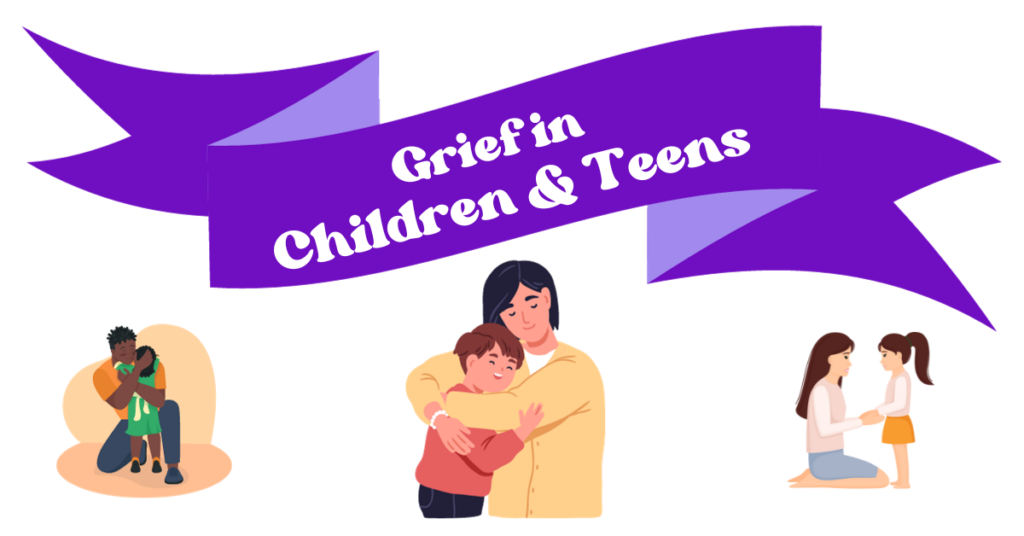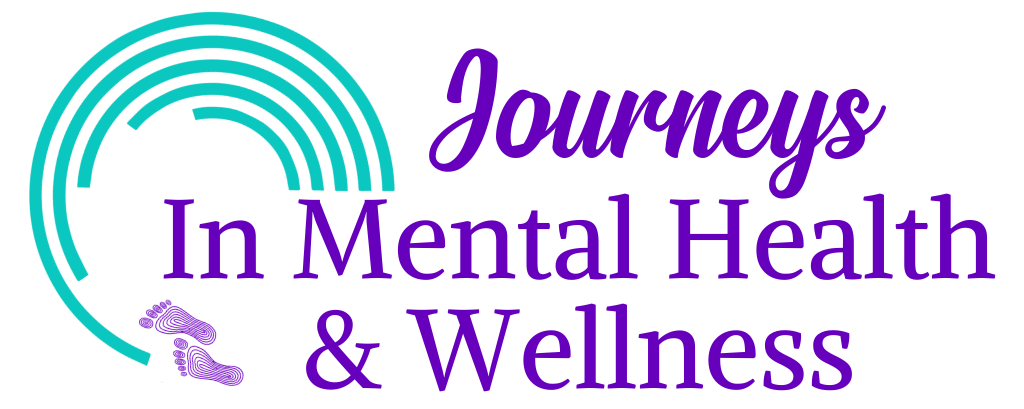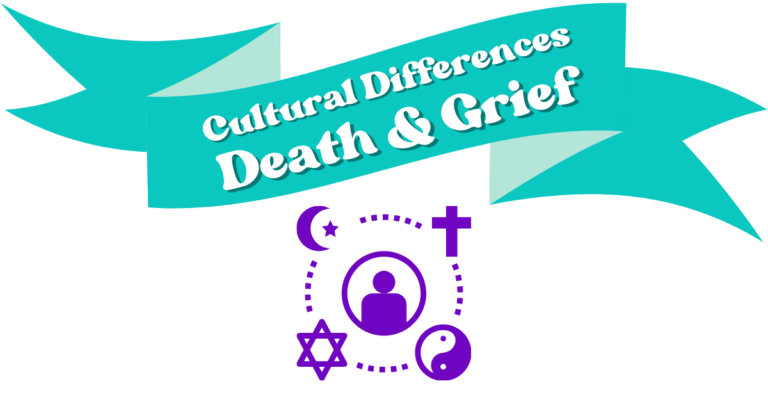
Tips to talk to children about Grief:
- Be Honest and Straightforward
- Do not use euphemisms Ex: “She’s in a better place”, She’s sleeping”, She is resting in peace”
- Acknowledge their presence, importance, their opinions, thoughts, and feelings.
- Be patient and open-minded. Allow them to grieve in their own way.
- Be available – Sit with the child, listen to them, and answer their questions.
- Let them know that a range of different emotions is normal.
- Validate their feelings and do not minimize them.
- Check-in with other adults involved in their life – teachers, school counselors, coaches
- Remember: It is okay to share your emotions and how you are feeling
Children who are having serious problems with grief and loss may show one or more of these signs:
- An extended period of depression in which the child loses interest in daily activities and events.
- Clinginess, Academic Issues, Difficulty concentrating, Inability to sleep,
- Loss of appetite, Prolonged fear of being alone.
- Acting much younger for an extended period; Developmental Regression
- Anxiety, Guilt, Behavioral reactions
What grief looks like for Teens:
- An empty feeling in the stomach and a loss of appetite.
- Guilt over something said or done, or something left unsaid or undone.
- Anger and lashing out at others, sometimes at any time for no reason.
- Intense anger at the deceased for dying, and later feelings of guilt for being angry.
How to understand a teen with grief:
- Grieving is the teen’s natural reaction to a death; – Grieving does not feel natural because it may be difficult to control the emotions, thoughts, or physical feelings associated with death. The sense of being out of control that is often a part of grief may overwhelm or frighten some teens.
- Each teen’s grieving experience is unique; – Teens grieve for different lengths of time and express a wide spectrum of emotions. Grief is best understood as a process in which bodily sensations, emotions, thoughts, and behaviors surface in response to the death, its circumstances, the past relationship with the deceased, and the realization of the future without the person.
- There are no “right” and “wrong” ways to grieve; Unless it is harmful to self or others, -Sometimes adults express strong opinions about “right” or “wrong” ways to grieve. But there is no correct way to grieve. Coping with death does not follow a simple pattern or set of rules nor is it a course to be evaluated or graded.
- Every death is unique and is experienced differently – The way teens grieve differs according to personality and the particular relationship they had with the deceased. They typically react in different ways to the death of a parent, sibling, grandparent, child, or friend. For many teens, peer relationships are primary. The death or loss of a boyfriend or girlfriend may seem to affect them more than the death of a sibling or grandparent.
- The grieving process is influenced by many issues. The impact of a death on a teen relates to a combination of factors including:
- Social support systems available for the teen (family, friends and/or community)
- Circumstances of the death – how, where and when the person died
- Whether or not the young person unexpectedly found the body
- The nature of the relationship with the person who died – harmonious, abusive, conflictual, unfinished, communicative
- The teen’s level of involvement in the dying process
- The emotional and developmental age of the teen
- The teen’s previous experiences with death
- Grief is ongoing – Grief never ends, but it does change in character and intensity. Many grievers have compared their grieving to the constantly shifting tides of the ocean; ranging from calm, low tides to raging high tides that change with the seasons and the years.
How to help grieving Teens:
- Teens encounter grief from a place that already feels complicated.- It can be difficult to determine whether a teen’s behavior occurs because of their grief or because they’re experiencing the stress and hormones that go along with adolescence.
- The grieving process is as individualized as each teen.- It’s helpful for parents to recognize that their teen’s grief will look different from their own and from the grief experienced by other teens.
- Many teens want to grieve with their friends.- The best way for them to grieve and express themselves is to find a friend, particularly if they are all grieving the same death. the experience can be different when a teen is grieving the loss of a parent or close family member. In that case, the teen experiencing the loss may feel less inclined to grieve with friends because they may feel like their peers don’t understand what they are going through.
- Grief is not a linear process.- The process involves spurts of grief and feeling like they don’t have a right to be happy.” Being aware that grief may ebb and flow can help parents provide support in the moment.
- Ask open and honest questions helps teens feel supported. Ask open-ended and non-judgmental questions. – Adults sometimes respond out of fear for their kids and unknowingly shut down conversations
- It helps teens when parents normalize difficult feelings that surround grief. – Normalize the range of feelings that come from unexpected loss. Don’t be afraid to shed tears in front of your kids, You’re modeling a grief response, you’re modeling that it’s okay to talk about grief and that feelings are okay, and you’re reinforcing that we all feel grief in different ways.
- Keeping a person’s memory alive can help with grieving. – Engage in conversation about the person who died. “It helps to say things like, “Tell me about them.” If you knew the person well, you could share your own memories.
- Social media can be both positive and negative. – Social media can provide benefits by helping teens feel connected and by offering an escape from the grieving process.
- Teens can experience PTSD even if they weren’t present when the death occurred.– Creating visual images in their head of what happened even if they weren’t there and hearing the stories of what happened can actually create a PTSD response.
- When teens respond in uncharacteristic ways to their grief, consult a professional.- pay attention to radical changes in behavior, like when a teen who used to enjoy being around family and friends now spends most of her time in her room. And if a teen talks about harming themselves or wanting to be with the person who died, reach out to a professional



